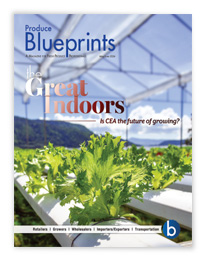Exotics and tropicals may be among the hottest current headliners, but don’t count out the growth of organics and a host of locally sourced seasonal produce for Philadelphia.
Locally grown
Philadelphia Wholesale Produce Market general manager Mark Smith notes that the PWPM’s location, a car ride away from fertile, productive farmland throughout Pennsylvania, Maryland, Delaware, and New Jersey, is a big plus when it comes to being able to offer a plethora of locally grown fruits and vegetables.
“We’ve noticed an increase in demand for locally grown produce as customers become savvier and more sophisticated in their buying decisions,” Smith says. “We happily source local produce from the beginning of the growing season to the end.”
Also a strong supporter of local and regional produce, Procacci Bros. Sales Corp. BB #:104174 buys product at the Lancaster Co-Op in Pennsylvania as well as from farms in New Jersey, Maryland, Delaware, and New York state.
Given Philadelphia’s prime location, growers in all of these states are considered regional.
As for why most merchants and retailers place added emphasis on sourcing produce from growers within a reasonable distance, Mike Maxwell, president of Procacci Bros., considers it a symbiotic relationship that just makes good business sense.
“It saves us money to buy from regional growers,” he notes. “It makes economic sense and keeps the agricultural land in agriculture.”
Organically grown
Organics, on the other hand, are more of a mixed bag.
John Vena, Inc., BB #:104221 for example, offers a limited program focused on a few commodities like garlic, herbs, and avocados. And while the company is currently working on launching other programs, Emily Kohlhas, director of marketing at John Vena, says the new efforts won’t be unveiled until 2020.
M. Levin & Company, BB #:104129 on the other hand, has seen a big uptick in organics, primarily in bananas, and the company’s own banana processing program. While the receiver/distributor isn’t too heavily involved in processed or packaged products, it is a certified processor of organic bananas, which, Mark Levin, CEO, says, have enjoyed significant growth as a category.
“Our organic banana program has grown exponentially in the past few years, and we expect to continue to see this growth trend in the years to come,” predicts Levin.
I Love Produce, LLC, BB #:204850 a West Grove, PA-based grower-shipper, importer, and exporter of garlic and ginger, is also bullish on organics. Company cofounder Jim Provost says it’s an important facet of the business to try to offer a range of both conventional and organic products to his customers.
Providing access to both segments is his goal, though Provost says demand for organics has indeed continued to climb. As for dealing with the higher cost of organics—that’s debatable—as Provost is quick to point out this just isn’t always the case anymore. “Because we source globally, we feel we offer great value,” he says.
This is a multi-part spotlight feature on the Philadelphia produce market adapted from the October 2019 issue of Produce Blueprints.



